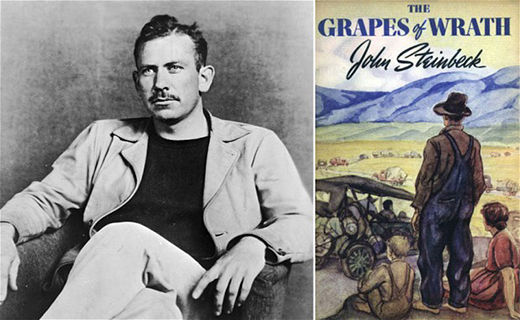
At the age of 37, John Steinbeck published his novel “The Grapes of Wrath” on Apr. 14, 1939. It won the 1940 Pulitzer Prize for Literature and has sold more than 14 million copies. He later won the Nobel Prize for Literature. It chronicled the mass migration to California over Route 66 of dispossessed farmers from the Dust Bowl region of the Great Plains during the Depression of the 1930s.
Millions more who have never read the book have seen the film version starring Henry Fonda and directed by John Ford. It also has been adapted for the stage.
The title derives from abolitionist Julia Ward Howe’s 1861 poem “The Battle Hymn of the Republic.” Turned into one of the most familiar American songs, its tune also accompanies the labor hymn “Solidarity Forever.” The verse goes: “Mine eyes have seen the glory of the coming of the Lord/He is trampling out the vintage where the grapes of wrath are stored.”
Steinbeck went to a government camp used by immigrant workers near Bakersfield, Calif., for his research, and fictionalized their hardscrabble experiences. Martin Chilton has written:
“The Associated Farmers of California dismissed the novel as a ‘pack of lies’ and ‘communist propaganda.’ The book was briefly banned in the Soviet Union by Joseph Stalin, because the ruling Communist Party was troubled by the thought that it showed that even the most destitute Americans could afford a car. Steinbeck received death threats and the FBI put him under surveillance. The book was banned in many libraries and copies were symbolically burned in towns across America. When WB Camp, one of the most successful cotton producers in California, presided over its burning in Bakersfield, he said: ‘We are angry, not because we were attacked but because we were attacked by a book obscene in the extreme sense of the word.”’
Woody Guthrie wrong the song “The Ghost of Tom Joad” based on the novel. Not only radicals loved Steinbeck’s novel; rather, it is the story itself that so profoundly resonated with the tragic but fighting spirit of American workers in the 1930s. It is chock-a-block with great quotes that do indeed suggest Steinbeck’s sympathies with the lot of the people. Here’s just one:
“And the great owners, who must lose their land in an upheaval, the great owners with access to history, with eyes to read history and to know the great fact: when property accumulates in too few hands it is taken away. And that companion fact: when a majority of the people are hungry and cold they will take by force what they need. And the little screaming fact that sounds through all history: repression works only to strengthen and knit the repressed. The great owners ignored the three cries of history. The land fell into fewer hands, the number of the dispossessed increased, and every effort of the great owners was directed at repression. The money was spent for arms, for gas to protect the great holdings, and spies were sent to catch the murmuring of revolt so that it might be stamped out. The changing economy was ignored, plans for the change ignored; and only means to destroy revolt were considered, while the causes of revolt went on.”
Also on this date, in 1930, in an incident like many others Steinbeck may have heard about or remembered, over 100 Mexican and Filipino farmworkers were arrested for union activity in Imperial Valley, Calif. Eight were eventually convicted of criminal syndicalism, or of unlawfully attempting to change the way government or industry is run or organized. “Just cause” for getting charged with criminal syndicalism included possession of labor newspapers and providing food to starving union workers on strike.
Adapted from http://www.telegraph.co.uk/culture/books/booknews/10755043/The-Grapes-of-Wrath-facts.html and North of Center: noclexington.com
Photo: Original cover










